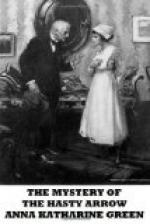It was not fear they showed, not exactly, though consternation was not lacking in their aspect, so strangely similar in all, whether they were men or women, or whether they stood in groups in the street or came out singly on the doorstep to glance about and listen, though there seemed to be nothing to listen to, for the air was preternaturally still.
“Carleton, Carleton,” she asked as he came to lift her to the ground, “see those people how oddly they act. The whole town is in the street. What is the matter?”
“Nothing, except that if we do not hasten we shall have to return unmarried. The minister is waiting for us.”
“What, in the church?”
“Yes, dear. We are a little late.”
She took his arm, and though they were a fine couple and the event was almost an unprecedented one in that remote village, only a few followed them; the rest hung round their homes or gazed with indecision at the mountains or up and down along the empty roads.
* * * * *
“Wilt thou have this woman....”
The ceremony had proceeded thus far and all seemed well, when with a rush and a cry a dozen people burst into the building.
“The snows are moving!” rang up the aisles in accents of mad terror. “Save yourselves!”
Then came the silence of emptiness. Every soul had left the church save the three before the pulpit.
An avalanche! and the ceremony was as yet incomplete! Ermentrude never forgot Carleton Roberts’ look. Doubtless he never forgot hers. Meanwhile the minister spoke.
“There is a chance for escape. Take it; the good God will pardon you.”
But the bridegroom stood firm and the bride shook her head.
“Not till the words are said which make us man and wife,” declared Carleton Roberts. “Unless”—and here his perfect courtesy manifested itself even in this crisis of life and death—“you feel it your duty to carry what assistance you can to the saving of your frightened flock.”
“God must save my flock,” said the minister with a solemn glance upward. “I am where my duty places me.” And calmly as though the pews were filled with guests and joy attended the ceremony instead of apprehended doom, he proceeded with the rite.
“Wilt thou have this man....”
The glad “I will” leaped bravely from Ermentrude’s lips; but it was lost in loud calls and shrieks from without, mingled with that sound—terrible to all who hear—impossible to describe—of the might of the hills made audible in this down-rushing mass, now halting, now gathering fresh momentum, but coming—always coming, till its voice, but now a threat, swells into thunder in which all human cries are lost, and only from the movement of the minister’s lips can this couple see that the words which make them one are being spoken.




